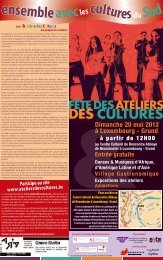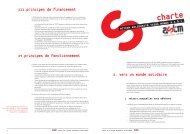Children - Terre des Hommes
Children - Terre des Hommes
Children - Terre des Hommes
Create successful ePaper yourself
Turn your PDF publications into a flip-book with our unique Google optimized e-Paper software.
120<br />
which is then purchased by petty traders at their doorstep<br />
for paltry amounts of Rs.20–30 per bag. The traders, in turn,<br />
sell this to poor domestic consumers and hotels in the town<br />
for Rs.100 per bag. Therefore, it was found that women<br />
and children are continuously working but earning very low<br />
incomes. The constant exposure to the smoke due to burning<br />
of coal at home is causing respiratory problems among these<br />
women and children.<br />
Displacement and Rehabilitation<br />
The ‘coal boys’ – young boys enrolled in school, but out all the time<br />
Hazaribagh (Photo September 2009)<br />
The workers reported that the company provi<strong>des</strong> 10 trucks per<br />
day for the local people as a source of livelihood for which they<br />
get Rs.1,200–1,300 per truck for loading 12 tonnes of coal. This<br />
is shared among all the members of the group. On an average,<br />
the workers load 18–20 tonnes per truck and get an additional<br />
wage of Rs.100 for every tonne. However, their income is<br />
entirely dependent on the availability of coal, which is erratic<br />
and hence the workers do not earn any money on some days.<br />
In Urimari, 14 villages with 95 per cent adivasi population were<br />
displaced by CCL and apart from monetary compensation the<br />
villagers reported that they did not receive any other benefits<br />
from the company. The young girls working in the mine sites<br />
complained that although they were opposed to the expansion<br />
of the coal mines, their villages are like islands around mine<br />
pits and the mining companies are eating into their village<br />
lands till they have no choice but to allow land acquisition.<br />
When questioned, the officials of CCL denied the presence<br />
of any child labour in their mine sites but commented that<br />
as child labour exists all over the country they are not to be<br />
blamed.<br />
“There is no child labour in the site and we prohibit<br />
that in the mining site. The issue of child labour is<br />
not new and not related to mining alone. Mining<br />
is not responsible at all for the rising trend of child<br />
labour and there is no relationship between mining<br />
and the issue of child labour”.<br />
–As stated by the General Manager and Superintendent of Planning<br />
and Implementation (SOP) of CCL<br />
On further questioning the officials admitted that children<br />
accompany their parents to the mine site and they may be<br />
involved in assisting the adults in some of the activities due to<br />
poverty. However, visits to the mine sites in the area revealed<br />
that children were clearly a large section of the mine workers<br />
and the officials preferred to turn the other side, almost as a<br />
favour to the mine workers’ families for allowing the children<br />
to work and eke out a living.<br />
Women and children from almost every household collect<br />
raw low-grade coal from the surroundings of the mine sites<br />
for getting a subsidiary income. They burn the coal at home,<br />
<strong>Children</strong> play with coal in mining affected community in Urimari Project area,<br />
Hazaribagh (Photo September 2009)<br />
There is not even public transport facility provided either by<br />
the company or by the government. There is a school that was<br />
set up by the company but it is dysfunctional. The only other<br />
facility provided is electricity, which is very erratic. Medical<br />
facilities are mainly provided to employees of the company<br />
and not to the local community or to the contract workers.<br />
Discussions with the village headman of Burkhundwah village<br />
are testimony of the manner in which the village leaders are<br />
bought over by the company to agree to the mining projects<br />
and to ensure that the people do not protest. The village is<br />
to be displaced and the village headman has already entered<br />
into an agreement with the company for it to be relocated to<br />
another place, with little or no consultation with the affected<br />
families, or with the women. The village leader was reluctant<br />
to express any negative impacts of the coal mining.






